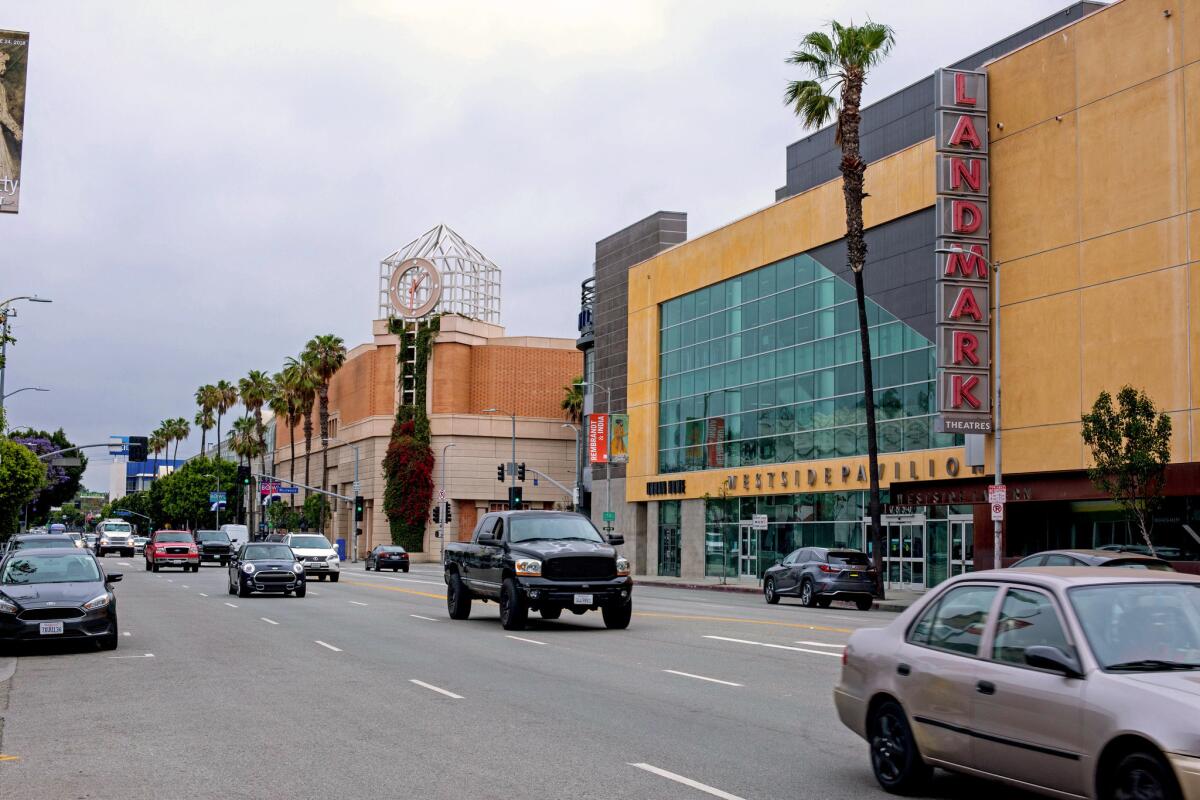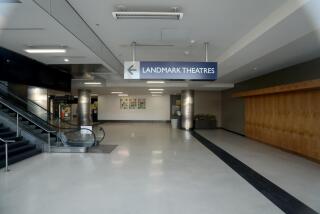A former Westside Macy’s will become the West End office complex in L.A.
- Share via
The shuttered Macy’s store at the former Westside Pavilion shopping center in West Los Angeles will be transformed into offices as part of a massive makeover by two separate developers working to turn the failed mall into a high-end haven for tenants in creative fields such as technology and entertainment.
Los Angeles developer GPI Cos. acquired the department store building in a separate transaction from one that enabled landlord Hudson Pacific Properties to redevelop the rest of the old mall. Hudson Pacific signed a lease with tech giant Google in January to be its sole office tenant in the complex.
GPI Cos., meanwhile, has renamed the former Macy’s building West End and will substantially alter the midcentury-style structure in a $180-million redevelopment.
While owners of shuttered shopping malls in many parts of the country have struggled to find new uses for them, the failure of the Westside Pavilion offered an opportunity to create new office space in one of the tightest office markets in the West, said Drew Planting, co-founder of GPI. Few large blocks of space are available on the Westside, and rents there are among the highest in Los Angeles County.
Indoor malls can be good candidates for conversion to “creative” offices in part because they typically have large floor spaces, ample parking and high ceilings that many interior design-conscious tenants find desirable.
The Westside Pavilion had a parking structure for approximately 1,500 cars, but it is obsolete and hard to navigate, Planting said. The old structure will be demolished in phases and replaced with a 1,000-car garage that will serve both West End and a portion of Google’s space in the redeveloped mall, which Hudson Pacific has renamed One Westside. The mall developer and GPI have agreed to share parking in the new garage.
Work already underway will turn West End into a 230,000-square-foot office complex set for completion in the first quarter of 2021. The three-story building will be cut from a rectangle into an “H” shape in order to introduce more natural light and create corner spaces for ground-floor restaurants, bars and stores.
The design by architecture firm HLW calls for floor-to-ceiling glass windows wrapping the exterior facades, a three-level central courtyard, private balconies and indoor and outdoor gathering spaces. The intent is to create the kind of flexible work environment “in such high demand by today’s leading creative and financial companies,” said Sejal Sonani, design principal at HLW.
Planting said he hopes surviving design elements from the 1960s — such as concrete slab ceilings that look like giant waffles, mansard roof and exterior arches resembling hockey sticks — will help give West End a funk factor that can’t be found in generic office buildings.
“There is a big gap between what is cool and what is a commodity in the rent that can be charged,” Planting said.
The former department store was built by May Co. in 1964 at Pico Boulevard and Overland Avenue to be one of its larger full-line stores. The Westside Pavilion incorporated the older May Co. store when it was built in the mid-1980s, replacing a strip mall called Westland Shopping Center.
May Co. was acquired by Macy’s in 2005 when it bought Federated Department Stores, May Co.’s parent company.
GPI bought the building and garage on 6 acres from Macy’s for $50 million in 2017.
Hudson Pacific and its partner Macerich also own a 6-acre portion of the former Westside Pavilion but control more future office space. Mountain View-based Google has agreed to occupy 584,000 square feet by 2022 in space designed by architecture firm Gensler.
The two developments at the old mall will be complementary, said Lee Wagman, a managing partner at GPI.
“It’s helpful that Google is next door with a well-designed project,” Wagman said. “Hudson and Gensler will do a great job.”

The 12-screen Landmark Theatres complex will remain in the reconfigured complex, as will the Westside Tavern restaurant and other shops mostly on the ground floor along Pico and Westwood boulevards.
The Westside Pavilion was once one of the city’s premier shopping venues and a cultural touchstone for generations of Angelenos, appearing in movies, television shows and music videos. It played roles in the 1995 film “Clueless” and the video for musician Tom Petty’s 1989 hit “Free Fallin’.”
In recent years the mall, now mostly empty, fell behind flashier competitors such as the Grove and the refurbished Westfield Century City malls. The rise of online shopping also took a toll, and anchor department stores Macy’s and Nordstrom departed.
Its future as an office complex is brighter, said real estate broker Carl Muhlstein of JLL, who represents West End for GPI. Demand for Westside offices has held steady since the last recession and big media companies including Google, Amazon and Apple have grabbed big blocks of space with a level of aggression not seen in the previous real estate cycle.
Those companies and other big media players including Netflix have been tying up new Los Angeles office space before it is finished and before they actually need it, Muhlstein said.
“The demand now is from the larger-size tenants because they are not only expanding but doing forward commitments,” he said. Interest in occupying West End has come from media, tech, esports and financial services firms.
More to Read
Inside the business of entertainment
The Wide Shot brings you news, analysis and insights on everything from streaming wars to production — and what it all means for the future.
You may occasionally receive promotional content from the Los Angeles Times.











